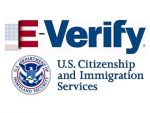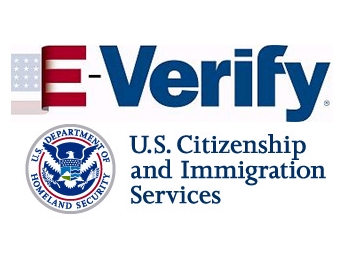

In his administration’s budget that it has sent to the White House, the Trump administration’s Fiscal Year 2018 Budget calls for mandating nationwide usage of the E-Verify system to reduce illegal employment. The system which is internet based, is currently voluntary except for those businesses that have government contracts. It compares information from an employee’s Form I-9, Employment Eligibility Verification, to data from DHS, the Social Security Administration, and State Department of Motor Vehicle records to confirm employment eligibility.
The budget for the Department of Homeland Security is $44.1 billion and in it the administration is calling for the expansion of “worksite enforcement strategies by mandating nationwide use of the E-Verify system.”
The Homeland Security FY 2018 Budget in Brief which can be accessed here, says in the overview section that the purpose of expanding E-Verify is “to support mandatory use of E-Verify nationwide within three years.”
In anticipation of the Trump move, Mark Schwartz of the U.S. Citizenship and Immigration Service (USCIS) Chief Information Office, was quoted by a section of the media as saying they are “streamlining the (E-Verify) process and making it capable of scaling if we bring more employers” into the system. The system which is free to employers to use has 646,000 users.
$131.5 million of the $44.1 billion Homeland Security budget will go towards the E-Verify expansion.
However in a recent blog post on the CATO Institute’s website, Alex Nowrasteh, said mandating a nationwide use of E-Verify would cost the federal government $635 million from 2018 to 2023. Quoting the Congressional Budget Office (CBO) numbers Nowrasteh said “It would additionally impose $10 million in annual costs on state and local governments, as well as a minimum $200 million in costs to the private sector as employers struggle to verify millions of employees.”
About Tom Gitaa Gitaa, Editor-in-Chief
Born and raised in Kenya's coastal city of Mombasa, Tom is the Founder, Editor-in-Chief and Publisher of Mshale which has been reporting on the news and culture of African immigrants in the United States since 1995. He has a BA in Business from Metro State University and a Public Leadership Credential from Harvard’s Kennedy School of Government. He was the original host of Talking Drum, the signature current affairs show on the African Broadcasting Network (ABN-America), which was available nationwide in the United States via the Dish Network satellite service. On the show, he interviewed Nobel laureates such as 2004 Nobel Peace prize winner, Professor Wangari Maathai, the first woman from Africa to win the peace prize and heads of states. Tom has served and chaired various boards including Global Minnesota (formerly Minnesota International Center), the sixth largest World Affairs Council in the United States. He has previously served as the first Black President of the Board of Directors at Books for Africa. He also serves on the boards of New Vision Foundation and the Minnesota Multicultural Media Consortium. He has previously served two terms on the board of the United Nations Association. An avid runner, he retired from running full marathons after turning 50 and now only focuses on training for half marathons.
- Web |
- More Posts(455)







